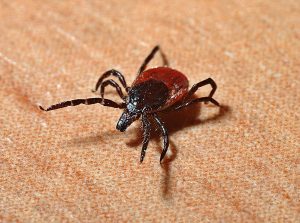Print a Sign-In Sheet | Spanish Version Coming Soon
When working outside, there is a greater risk of encountering pests, such as ticks, spiders, and snakes. These risks can be present at any time of the year and are not necessarily outdoor risks only. It is important to take steps to prevent bites and injuries. See the following safety tips below to help avoid exposure to these types of bites:
Tick and Spider Bite Prevention Tips:
- Wear appropriate clothing that covers your arms, legs, and feet.
- Exercise caution when moving debris.
- Wear personal protective equipment (PPE), such as gloves and boots.
- Wear boots that come up several inches around the ankle.
- Use insect repellents with DEET or Picaridin.
- Stay away from spiders and ticks as they can cause injury or disease.
- Wear light-colored clothing so ticks are more visible.
- Shower after work and wash and dry clothing at a high temperature.
- Check your body for ticks after working outdoors.
- Remove ticks quickly and cautiously using tweezers.
- Seek medical attention if signs of infection, pain, nausea, or fever are present after a bite.
Snake Bite Prevention Tips:
- Keep an eye out for snakes on trees, downed limbs, and the ground.
- Wear appropriate clothing that covers your arms, legs, and feet.
- Wear boots that come up several inches around the ankle.
- Exercise caution when moving debris.
- Keep an adequate distance from snakes as their striking distance is generally one-half their length.
- If encountered, stay back and allow the snake to proceed.
If a Snake Bite Occurs:
- Keep snake bite victims still and calm.
- Avoid cutting the snake bite wound or trying to suck out the venom.
- Keep the snake bite area below heart level.
- Apply clean, dry, and sterile bandages to bite wounds.
- Seek medical treatment for the bite victim.
Other Safety Considerations:
- Stay away from wild, stray, or dead animals as they can cause injury or disease.
- Keep a well-stocked first-aid kit readily available.
- Complete a first aid training course.
KEMI does not assume liability for the content of information contained herein. Safety and health remain your responsibility. This information is to be used for informational purposes only and not intended to be exhaustive or a substitute for proper training, supervision or manufacturers’ instructions/recommendations. KEMI, by publication of this information, does not assume liability for damage or injury arising from reliance upon it. Compliance with this information is not a guarantee or warranty that you will be in conformity with any laws or regulations nor does it ensure the absolute safety of any person, place or object, including, but not limited to, you, your occupation, employees, customers or place of business.

